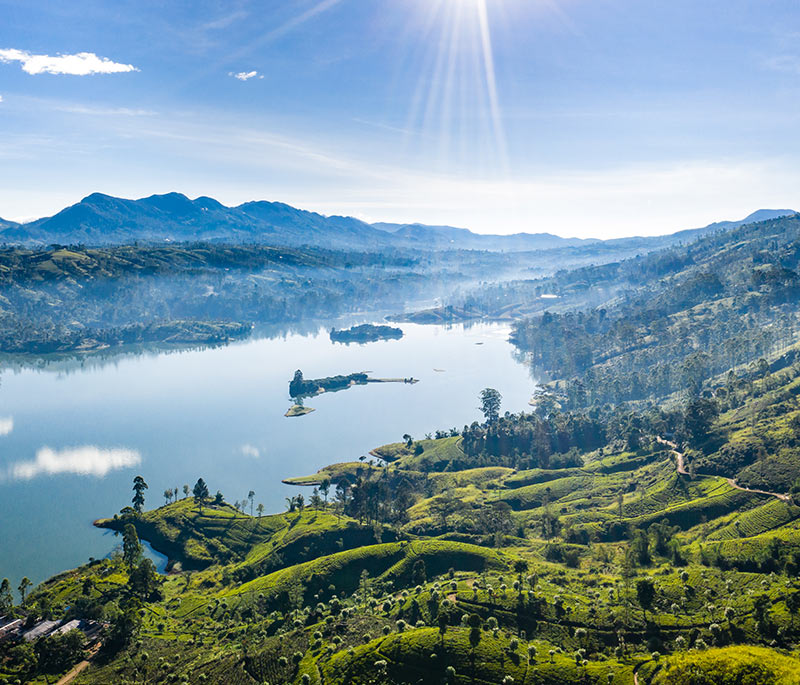Trail Blazing with Lost Ingredients
It is the ultimate test of innovative efforts and labours – will those giving eye and ear to their offerings, embrace them for further development so that the world would be Sri Lanka’s oyster for the humble jackfruit and gotukola (pennywort) and the hardly-noticed seaweed?
There is much activity at the ‘Genesis Project’ – the Dilmah Centre for a Sustainable Future through Kindness, Collaboration and Nature-based solutions at Maligawatte. The scene was the first Demonstration Day for innovative entrepreneurs – with similar but at the same time very different life stories and varied products, now given a hand to reach for the skies. The hub, of course, was the ‘Lost Ingredients Lab’.
For Dilmah, the tea giant, this location was where it all started small, the Head Office and manufacturing complex at 52, Maligawatte Road “as in the beginning”, where Founder Merrill J. Fernando had the dream of producing the world’s first genuinely ethical tea which came true. With Merrill himself dedicating the ‘birthplace’ of Dilmah to the Genesis Project on May 6, last year (2022), it has now become a second ‘home and workplace’ for its first pioneers, selected through a rigorous process – six from around 120 applications. Dilmah has within the folds of the Genesis Project, in addition to the Lost Ingredients Lab, a Digital Library, a Co-Working Space, a Market Space and a Townhall Space.
The Lost Ingredients Lab was made possible with Euros 500,000 (around Rs. 178 million) from the European Union (EU), the first time it has given a grant to a Sri Lankan corporate, and the German Agency for International Cooperation (GIZ) of the German Federal Government. The technical consultants for this lab are Good Life X (GLX). After the unveiling of the Lost Ingredients Lab kitchen, Senior Chef Anura Uduwara Arachchi from Water’s Edge Hotel demonstrated how the snacks the invitees and participants would later savour were prepared using ‘lost’ or ‘not-given-due-place’ ingredients such as gotukola (pennywort), seaweed and jackfruit.
Green and healthy are the products of Lakmini Weerakkody (29) from Bandaragama. While attending work from home, she was able to try out her hand at dehydrating vegetables, fruit and green leaves because she knew that a lot went to waste because they were perishables. Banking on her food technology background, Lakmini was able to make a small machine and carry out trials on right temperatures for dehydration for different fruit, vegetables and green leaves, without destroying their natural properties and nutrition. Employing and empowering two women in the area, she was sending samples with much emphasis on gotukola (Centella asiatica) amounting to about 500 kilos a month in 2019 to businessmen who were exporting them. Putting by most of her salary, she had been able to expand her business in 2022 and now owns a quality-certified small factory as well as a bigger machine. Heading Lak Nature International, an all-female business which has given 20 women in the low-income bracket a way to eke out a living, she produces 3,000 kilos of dehydrated products a month. Through the golden opportunity of the Genesis Project, this ‘Gotukola Goddess’, as she is called with affection, would be pitching her signature products of gotukola porridge, tea, soup and salad, with the hope of widening her horizons over the seas.
It is another plant product – seaweed – that Shawn Senarath (24) from Colombo will put forward for attention and investment through his business Ceylon Aqua and Agri, as he says with conviction that there is much potential for it. Getting seaweed from farmers, a majority of whom are women, in Jaffna and Mannar, he says it is a stable income generator because the harvesting can be done in 50 days. While seaweed strengthens the coastal eco-system and restores it rather than taking anything away from it, value-addition and vertical integration of this product could bring into the country much-needed foreign exchange because it is a popular and nutritious food in many countries. Shawn is offering sea-moss gel which has 92 of the 102 minerals essential for human well-being.
Burger patties and nuggets, both jackfruit based are what Sahan Bakmiwewa (28) from Colombo puts up for grabs to investors through his company dubbed Plant Based Studios. He was engaged in organic spice exports from his Matale factory when numerous were the queries from the west about polos, the tender jakfruit. Why, he wondered, and found to his amazement that with many going down the vegan pathway, the attraction of polos was its meat-like texture which made it a good vegan substitute. Sahan too tried to go vegan, but the resolve lasted only three days, he smiles, for the food was not very tasty but it was very expensive. While his company is also producing rice milk made from traditional rice varieties, he is hoping that investors would pick up the polos burger patty and nugget and make them sizzle in hotels, restaurants and cafes locally and later internationally.
Sharmilan Somasundaram (28) from Batticaloa introduces us to his start-up Niftron which is offering ‘blockchain’ technology. This technology, a service platform, is an advanced database mechanism that allows transparent information sharing within a business network, he says, explaining that a blockchain database stores data in “blocks” that are linked together in a “chain”. Sharmilan underscores that there is no paper trail or documents which could be fiddled with. A blockchain, say with regard to an organic product, would leave clear traceability from farm to market, with consumers being able to scan a QR Code and see its journey. Citing a few examples, he says that this service platform can be used to trace the story of the cultivation of traditional rice varieties, Sri Lankan women in the apparel industry who stitch intricate lace and whether plastic manufacturers are in reality using recycled raw material.
It is another traceability solution with a different tweak that Mathangey Sathiyamoorthy (27) from Colombo is putting forth through her company, Polar. This solution uses the Internet of Things (IOT) technology, she says, allowing the tracking of any type of perishable food through all stages of production, processing and distribution. Picking up a stock of vegetables being transported from a Sigiriya farm to a market shelf in Colombo in a truck with cooling facilities, Mathangey says this platform and device would send real-time data and alerts when necessary on the condition of the stock. Then if there is a disturbance in the temperature which could cause a deterioration of the vegetables, immediate action could be taken to correct it. Global expansion is what she is looking for.
Joining on Zoom from Matale is Kapila Weeratunga Arachchi (59), an entrepreneur who develops and manufactures different types of dryers through his company Saviru Technologies & Services, for businesses engaged in dehydration techniques for vegetables and fruit. His dryers with a capacity ranging from 5 kilos to 5,000 kilos can work with wood, oil, gas or electricity. Now brand development is his forward direction.
Says Good Life X CEO Randhula de Silva that they are excited to have the next generation of innovators of Sri Lanka fully embrace the potential of these undiscovered ingredients and take it to greater heights internationally. “This community of entreprenurs aims to mark Sri Lanka on the global map for the right reasons.” The final words come from Head of Conservation & Sustainability, Dilmah Tea, Shamodi Nanayakkara: “The six companies of the Lost Ingredients Lab were handpicked through a tough competition. Looking at the impact and the progress they have made through the programme, we are proud to commend them as trailblazers of Genesis.”
Article published on The Sunday Times.





